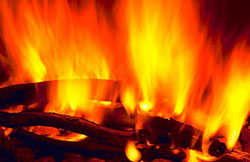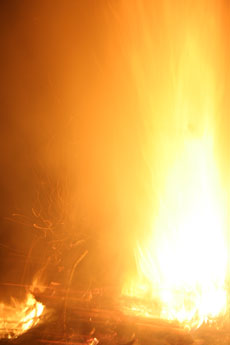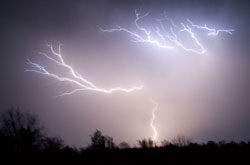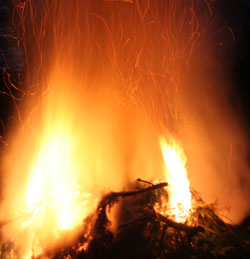| |
When [Ahab]
saw Elijah, he said to him, ‘Is that you, you
troubler of Israel?’ ‘I have not made trouble
for Israel,’ Elijah replied. ‘But you and your
father’s family have. You have abandoned the
Lord’s commands and have followed the Baals.’
(1 Kings 18:17-18) |
|
It was always going to be
a stormy confrontation. Ahab would have felt more than
mildly apprehensive as he set out to meet the man he
perceived to be his chief political opponent. The
jittery king promptly accused Elijah of being the cause
of all the trouble in Israel, but Elijah flung the taunt
back in his face. ‘You’ve got it wrong, Ahab. This
drought has come upon the nation because you chose to
worship the Baals. You’re the real cause of all the
trouble – not me!’
The king was dumbfounded. Nobody had ever had the
nerve to speak to him like this. The prophet’s bravery
struck him as forcibly as the truth he was speaking.
Unable to deny the accusations, he agreed to the terms
of the challenge Elijah proposed: an unprecedented
contest which would demonstrate to the nation whether
God or Baal was really Lord.(1)
Why did Ahab agree to meet Elijah face to face when he
could have sent a patrol to arrest him? The answer is
that when we obey what God has shown us to do, it is His
joy to bring about the humanly impossible. Moreover,
after three years of devastating drought, Ahab could
hardly fail to realise the power of God’s word through
Elijah. What he wanted to know now was whether Elijah
really did have the power to make it rain again.
As word of the forthcoming contest was sent out, the
people streamed westwards to join the 450 prophets of
Baal on Mount Carmel. Prophets require a forum for their
message, and Elijah knew that there would never be a
better moment to call the nation back to God. At the top
of his voice, he presented the people with the clearest
challenge they had faced since the days of Joshua.(2)
‘Why do you labour for food that spoils and that does
not endure to eternal life? If the Lord really is the
supreme God, then why is He not also your supreme love?
How long will you waver between two opinions? If the
Lord is God, follow Him, but if Baal is God, follow Him.
But the people said nothing.’(3)
When Elijah had finished cutting through their excuses,
he knew that something more than words was necessary to
rouse the people from their spiritual sloth. Every
preacher knows this feeling. The whole galaxy of our
modern day ‘gods,’ with their prized scientific
achievements and abundant material possessions, has
taken much the same toll on the soul of the nation as
the idolatrous Baals did: deadening souls to the call of
God on our lives.
It is altogether right and proper that we should cry out
for a double portion of His Spirit in our own
generation, and a renewed demonstration of the power of
God.
| |
Then Elijah
said to them, ‘I am the only one of the Lord’s
prophets left, but Baal has 450 prophets. Get
two bulls for us . . . The god who answers by
fire – he is God.’ Then all the people said,
"What you say is good."(4)
Elijah summoned his adversaries to prepare a
bull and to call down fire from heaven. Like
Abraham, who was content to offer Lot the best
of the land, he was happy to let his opponents
go first in the contest. |
 |
Both men showed complete
confidence that God was bigger than all the odds stacked
against them. Elijah rejoiced that he had trapped the
prophets of Baal into attempting what he knew to be
beyond their powers to perform.(5)
The Longest Day
The whole episode is a stunning reminder of what can
be achieved by faith in the face of overwhelming odds.
Because we know the outcome, we should not be tempted to
dismiss the contest as a foregone conclusion. Although
the words ‘fire’ and ‘God’ are frequently linked in
Scripture, the devil, too, has the power to send down
fire from heaven.(6) But God would not suffer the devil
to intervene, for this was His hour of judgement on the
powers of darkness.
For six long hours Elijah endured the rabid sounds of
the prophets chanting and shouting to their horrible
god. The tension and oppression must have been well nigh
overwhelming. Whichever way he looked, he would have
seen no friendly face to encourage him.
The devil loves to make us imagine that he is in control
of our circumstances. He hates it when we have the
courage not to take him seriously!(7) The louder his
opponents shouted, and the deeper they lacerated
themselves in their desperate attempts to release Baal’s
power, the bolder Elijah became, taunting them
fearlessly.
Now, the moment of reckoning had come. The followers of
Baal had to face the fact that their pleas had remained
unanswered. All they could hope for was that Elijah’s
God would prove to be equally as impotent.
In a sense, Elijah’s years of hiddenness had been but a
preparation for this moment. Long before fire fell from
heaven and incinerated the sacrifice, his heart had been
burning that God should intervene, so that the nation
should again worship their God. For that reason alone he
was willing to step forward, and cry out for God to
demonstrate His power.
 |
Elijah’s first action was to take twelve stones, one for
each of the tribes, and to build an altar to the Lord.
T
his was a symbolic restoration of the altars that Ahab
and Jezebel had overthrown. Although only ten tribes
were represented on Mount Carmel, Israel had always been
one in God’s eyes. Elijah offered his sacrifice on
behalf of the whole nation.
|
Then, to prove beyond doubt that nothing is too hard for
the God of Israel, Elijah poured twelve full barrels of
precious water over the sacrifice. Then he prayed: "O
Lord, God of Abraham, Isaac and Israel, let it be known
this day that you are God in Israel, and that I am Your
servant and have done all these things at Your command.
Answer me, O Lord, answer me, so these people will know
that You, O Lord, are turning their hearts back again."
Then the fire of the Lord fell and burned up the
sacrifice, the wood, the stones and the soil, and also
licked up the water in the trench.(8)
Whatever the fire might do to the worshippers of Baal,
Elijah had no fear that it would hurt him. In a moment
of holy terror, Elijah’s sacrifice was consumed. What
was so extraordinary about this fire is that it blazed
from above, rather than from below, as ordinary ones do.
It truly was a fire from heaven.(9)
Stunned by what they had witnessed, the people threw
themselves prostrate. Slowly they recovered from their
shock and took up a chant, its echoes rolling around the
hillside as they cried aloud, ‘The Lord, He is God.
The Lord, He is God.’ At last they were willing to
commit themselves to the true and living God. |

SallyMowbray |
A stand for God means taking a stand against the
counterfeit. Judgement was immediately executed on the
false prophets. We are spared the gruesome details,
being told only that the prophets of Baal were put to
the sword in the Kishon valley. A new day had dawned for
the people of Israel.
Lessons from Mount Carmel
We can learn important lessons from this amazing
episode. Firstly, that it is prayer which releases the
power of God – but that we must take our stand and play
our part. Just as Elijah wasted no time in putting to
death those who had been robbing the nation of its
vitality, so in our life, too, there come seasons of
special opportunity.
The Lord sometimes seems to take forever to respond to
our prayers, only to answer many years of prayer all at
one go. We stand amazed at all that He is doing, but we
must still take care to implement what He is offering
us. Opportunities must be seized with both hands, if
awakened interest is to mature into fully-fledged
discipleship. When God stirs up an interest in spiritual
things in someone’s life, we must be at hand to
introduce them to the Church, and to help them take
appropriate action.
Secondly, we cannot move on without commenting once more
on the purity of Elijah’s motivation throughout this,
the longest of days. There are many who pray for fire to
come, in the naive assumption that heaven will
automatically support their cause. There is a fine line
between seeking the kingdom of God and our own
self-advancement.
| What is quite clear is that Elijah was motivated not in
the least by his own self-interests, but rather by a
passionate desire to see God vindicated in the eyes of
the watching nation. As He so often does in the work of
intercession, God had inextricably bound His servant’s
fate to the destiny of the nation.
And Elijah was
willing to place his own life on the line if only God
might honour His name with a stunning display of His
power. I suspect that if our hearts were similarly
motivated we would witness far more works of power than
we currently do. |
 |
Thirdly, the ecstatic prophets of Baal serve as a
warning that mere enthusiasm in religion is no proof of
its authenticity. As we shall be considering in the
chapter ‘The Challenging Counterfeit,’ spiritual power
may come from many sources. It is not only
impressionable teenagers, but seemingly solid members of
the kingdom, who can be swept away by strange ideas or
sudden mid-life crises. The devil strives to inflame our
emotions, confuse our minds, ruin our health and damage
our reputation.
No matter how exciting some new vision or idea may
appear to be, we should give the matter time, and test
the spirits before embracing it too readily. Is the hand
of heaven really on it? If it is, then we need not
attempt to ‘whip up’ the fire from heaven by our own
emotional fervour. We can look to the Lord in full
confidence that those who wait on the Lord shall not be
put to shame.
Fourthly, those who claim that the Church has inherited
all God’s promises for Israel, would do well to ponder
the fact that there are more than seventy references to
Israel in the New Testament. In all but one of these, it
is unequivocally clear that Israel stands for literal
Israel, and not for the Church. To substitute the one
for the other has been the cause of much needless error
and confusion. God selected the Jews for much the same
reason that He chose us: to be a demonstration to the
world of what He can do through a small, stubborn and
insignificant people. And He does not forget His
promises!(10)
Fifthly, it is salutary to note that many of the most
effective prayers of Scripture are extremely short and
succinct. Unlike the prolonged ravings of the prophets
of Baal, Elijah’s prayer for fire to fall was both brief
and to the point. It consisted of just two verses and
fewer than sixty words. What a contrast to certain
prayer meetings we have all endured!
Finally, we can take heart from Elijah’s confrontation
of the Baals. The power of God is able to break through
in any situation. The episode is a challenge for us not
to be afraid to commit ourselves wholeheartedly when the
Lord calls us into action against the powers of
darkness.
Members of Wellspring, the worship group I work
with, were ministering recently in the cathedral in
Karachi. (There has been much discrimination in
Pakistan against the Christian community).
As they prayed for the Spirit
of God to come on the gathering, several people outside
the building saw flashes of what looked like lightning
illuminating the sky around the cathedral.
So impressive were these manifestations that one local
witness thought a power station was blowing up! Inside,
many were being converted, healed, delivered and filled
with the Spirit of God. We can take heart. God will move
in power when our prayers stem from a heart that has
been touched by His fire. |

Morguefile |
True
faith will never be disappointed.(11)
Moreover, those who have trusted the Lord in the face of
apparent impossibilities acquire a degree of spiritual
confidence that blesses many other people.
Reflections
God is looking for people who will pray for His
fire to fall on situations which may appear as outwardly
daunting as that which Elijah faced on Mount Carmel.
Specifically lift one or two of these dilemmas to the
Lord now.(12)
Selah
Thank You, Lord, for the passion You gave
Elijah, and for the clarity of his faith.
Release more of this power in our lives, and
in the heart of your Church.
May it burn up unbelief and confusion, and
set us free of much that has robbed our
faith.
Right now we take our stand against the
specific difficulties that Satan has
targeted against us, and release Your power
into the work and visions You have set
before us. We look less to how big the
storm, is, and more to how big You are.
In Jesus' name, Amen.
|
 |
|
|

